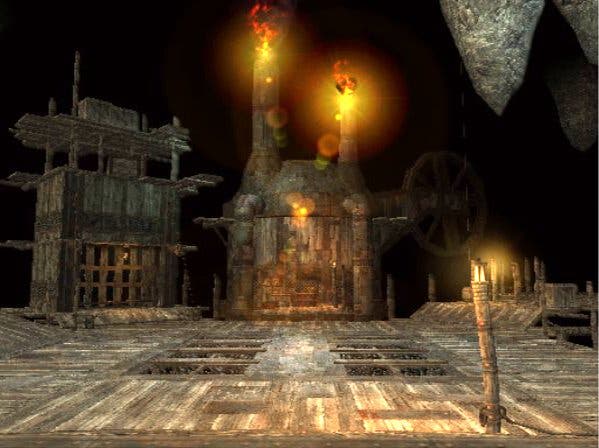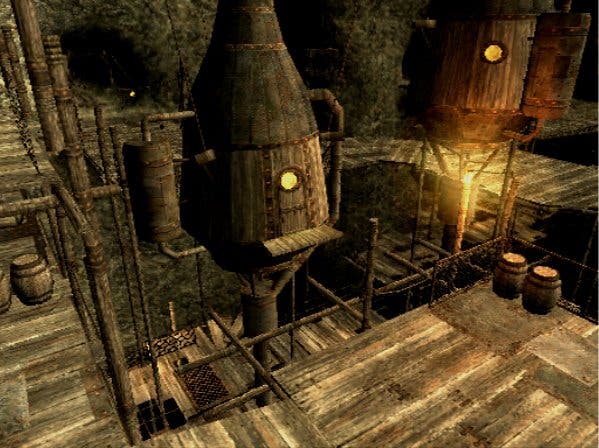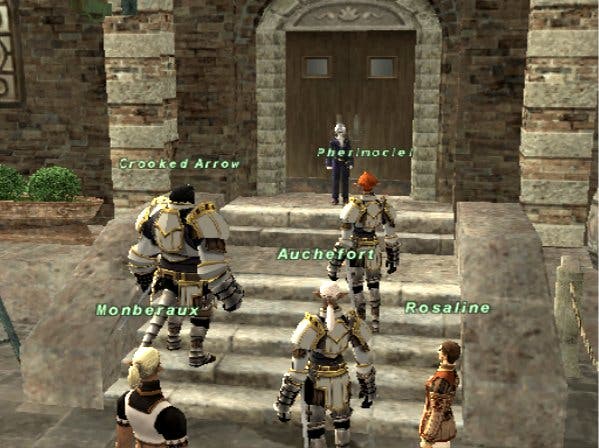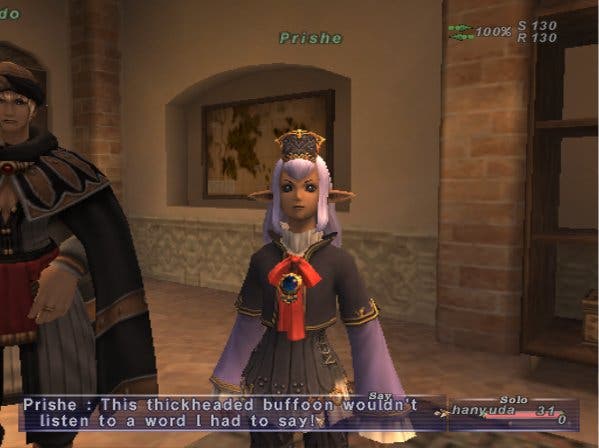Final Fantasy XI
With the game due out in Europe this week, we consider whether it's the MMORPG-shaped timesink we've been looking for.
Order yours now from Simply Games.

Massively multiplayer online games are a timesink. Although few game genres can boast such a large horde of vocal apologists, you'll find few people who disagree with that statement or sentiment. After all, the objective of an MMORPG is to extract a subscription fee from your bulging wallet every month - and in order to keep you playing and make you feel like you're getting value for money, it needs to have the kind of content that keeps you coming back hour after hour, day after day. A timesink, in other words.
The quality of an MMORPG, then, can largely be judged on how good it is at achieving that goal - and how much fun it is in the process. It's a rare genre where popularity actually is a fairly good indicator of quality; but equally, it's a genre that is almost impossible to review. Massively multiplayer games don't just exist as monolithic entities - they evolve from day to day and from week to week, and your experience of playing one will be influenced as much by the people you play with as by the game itself.
That's a major part of the reason why Eurogamer has never really given the massively multiplayer genre more than a passing glance. While we've always stuck firmly by the principle that any review is just one person's opinion (albeit, hopefully, one well-informed person's educated opinion, expressed clearly and literately), when it comes to massively multiplayer titles, your enjoyment is just so subjective as to make a review utterly pointless. Besides - how can you possibly review a game which never ends, and which it takes months to reach a high level in? Add to that the fact that MMORPGs are, frankly, a niche genre which traditionally appeal to a pretty small group of people, and perhaps our reasoning in not devoting acres of text to the whole area is more clear.
All Those Fantasies

When Final Fantasy XI arrived in the USA, however, we were forced to change our tune somewhat. Here was an MMORPG attached to one of the most popular gaming franchises in history; an MMORPG which would have a PS2 version (which won't be released in Europe, we've since discovered, but you can't win 'em all - and by all accounts this is down to Sony's reticence to release the PS2 hard drive here, not any evilness on Square Enix' part), no less. In other words, it was an MMORPG that a lot of people who were frankly baffled by the life-destroying antics of EverQuest and Ultima Online fans were probably going to dip their toes into.
Final Fantasy XI isn't the last MMORPG to fall under that category, and it won't be the last one that we devote significant coverage to - expect to see plenty about World of Warcraft on these hallowed HTML layouts in the near future, as we approach the launch of yet another massively multiplayer title which threatens to make the whole affair much more attractive to the "normal" gamer - that's you or I, for reference, as opposed to people who make themselves ill playing 24/7 in order to stay on betas after the closing time, or construct devices from Lego to level up tradeskills without being at the keyboard, or urinate into empty bottles to avoid having to go for potty breaks. You all know who you are.
However, even as we return to Final Fantasy XI ahead of its launch (finally!) in Europe this Friday, we're not going to publish a review with a score. The experience of playing the game is still too subjective, and it's utterly pointless to put a score for an MMORPG onto the same axis as scores for normal offline or multiplayer games. We might as well start publishing cheese reviews here, proudly proclaiming Camembert to be "better than Halo!" while Cheddar is simply an average, 5/10 kind of cheese which you should probably pick up on budget but not pay full price for. [Controversial -Ed]
Virtual Life

Instead, we'd invite you to read through the thousands of words previously written here about Final Fantasy XI - check out our impressions of the US version of the game, or our first look at the Chains of Promathia expansion. We'd also like to share a few thoughts with you about the game, many months after we started playing, but a few days before those of you who didn't fancy braving the import route will have a chance to get your grubby mitts on a copy.
Firstly, let it be said that Final Fantasy XI exceeded our expectations - which were admittedly somewhat cynical on the whole topic of MMORPGs - in almost every way. The game has the kind of rich, beautifully crafted and varied world that you'd expect from a Final Fantasy game, with a fascinating back-story which is still unfolding through the various expansion packs and content updates. Graphically it's a surprisingly good looking title for what is effectively a PS2 port, and while the pop-up is a little annoying in places, the game meets the twin requirements of looking good, and not requiring a beast of a machine to run it.
The version of the game which Europeans will see on Friday is an extremely mature and well-polished title - a far cry from the original Japanese release, by all accounts. With years of content updates and two full expansion packs included in the box, the game is absolutely enormous even by MMORPG standards, and Square Enix' focus on continuing to add content for low and mid-range characters as well as high level characters means that here's a rich abundance of content, storyline and tasks for players to experience the whole way through the game. Even the new Chains of Promathia expansion is mostly open to players from level 30 onwards, rather than requiring you to be an insane level 75 powergamer - a welcome move.
The focus on storytelling - even to the extent of including a large number of recurring NPCs with fully scripted cut-scenes, in true Final Fantasy style - makes FFXI into a particularly interesting proposition for those who are put off by the levelling treadmill syndrome that afflicts most MMORPGs. While FFXI is certainly not immune to that factor, it's refreshing to have another incentive to play through the game; not just "I must reach the next level so that I can use a differently named sword to inflict the same percentage damage on slightly harder enemies," but "I'm interested to see where this storyline is going and want to see more." The lessons of writing hugely successful offline RPGs haven't been lost on FFXI's creators, and it shows.
Haven't we met before?

The game, however, is certainly not without its flaws. Get into a party with a bunch of tossers, and you'll quickly begin to loathe FFXI, while actually getting into a party in the first place can be exceptionally difficult at times, not least because of the aforementioned tosser-factor. Square Enix can't really be blamed for the sorrowful state of mankind, we suppose, but it's still very detrimental to the gameplay experience as a whole - a problem faced by every multiplayer game in existence, but one worth considering before diving into the world regardless.
More of a concern is that once you reach the mid-levels, you start to feel a sense of déjà vu about much of what you're doing. The game shamelessly re-uses models for its creatures, weapons and armour, which is extremely disappointing - the fact that thirty levels into the game, you can still be hitting the same rabbit model with the same sword model while wearing the same armour model that you were twenty levels previously ruins the sense of progression. A bit more effort in terms of providing different textures, if not different models, would have gone a long way, and it's a shame that Square Enix - whose offline games usually have an astonishing menagerie of creatures and equipment - didn't see fit to devote more effort to this area of the game.
It's also worth noting that if you're an anti-social type, this isn't the game for you. Beyond about level 10, there's sod all point to running around on your own - in order to accomplish anything or progress the game in any way, you must be in a party. Few MMORPGs have been so harsh on those who prefer solo play - and while for us the whole point of playing a massively multiplayer game is to, er, do so in a multiplayer fashion, your mileage may vary (and does vary considerably, given the bleating on many message boards about being forced to play with other human beings in a multiplayer game).
Questions. And Answers.

Final Fantasy XI hasn't quite made MMORPG converts out of us, but it's certainly made us look at the genre with fresh interest - as have other recent and forthcoming titles like City of Heroes and World of Warcraft. It may not have the subscriber base of EverQuest, but there's a distinct feeling that when we look back at the genesis of the massively multiplayer game, FFXI may well be seen as something of a landmark title, where the genre really started to open up beyond the realms of the bottle-pissers who inhabited former hits like EverQuest and Ultima Online.
While we have to admit that we're no longer playing the game - we're quite fond of our jobs, health and relationships, all things which don't survive an MMORPG addiction terribly well - even after paying US import price for copies, there's no doubt that we got our money's worth out of Final Fantasy XI. So we won't give the game a review score, but simply say this - in our humble, subjective, opinion, it's good. Very good, in fact.
We'll leave you with a few choice thoughts on the European launch of the game, the new expansion pack and Square Enix' future online plans - from no less a personage than Hiromichi Tanaka, Square Enix senior vice president and producer on Final Fantasy XI, ably assisted by the company's lead translator and localisation director, Richard Honeywood. Click here to see what he had to say, and have fun in Vana'diel.

